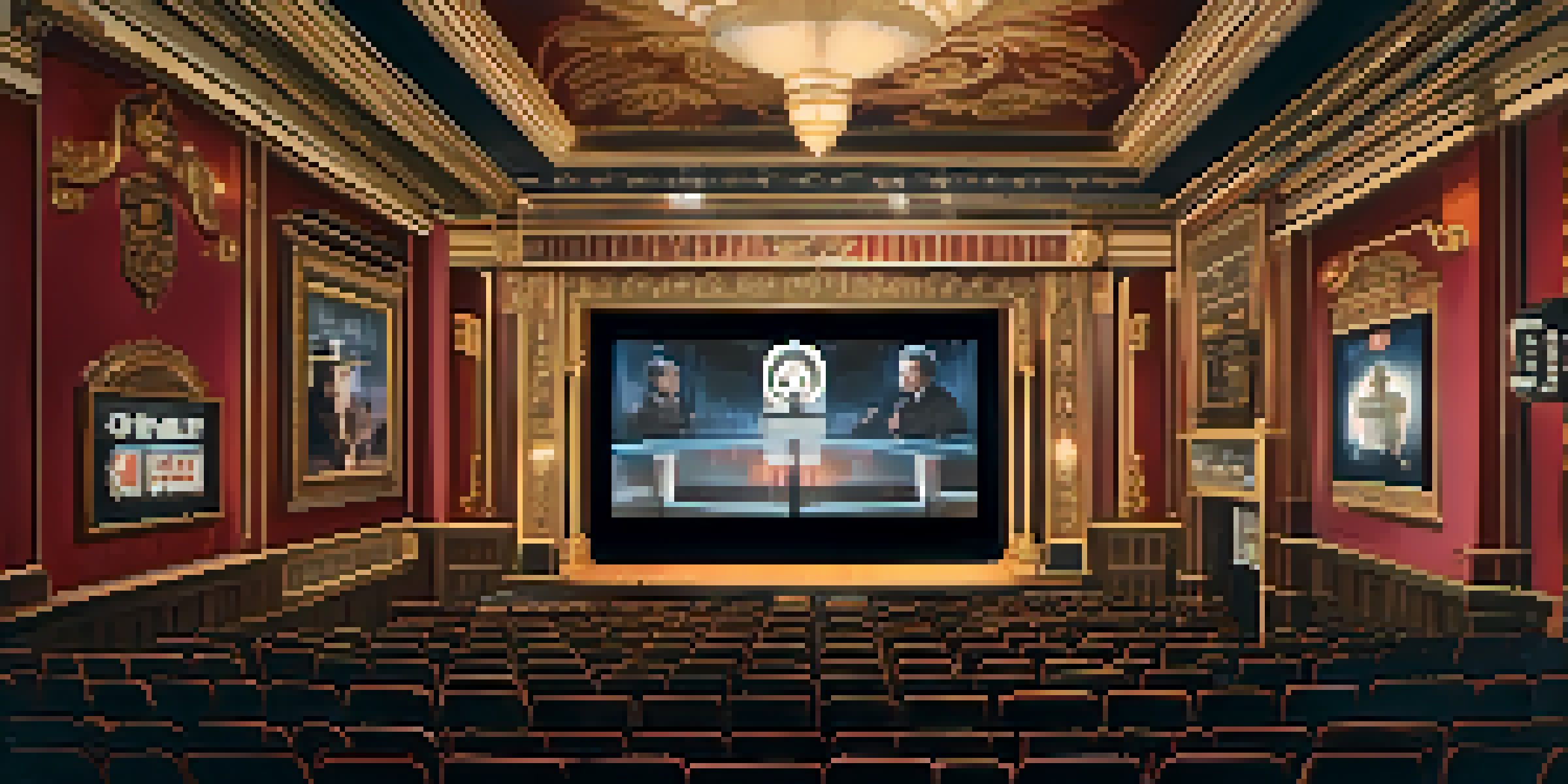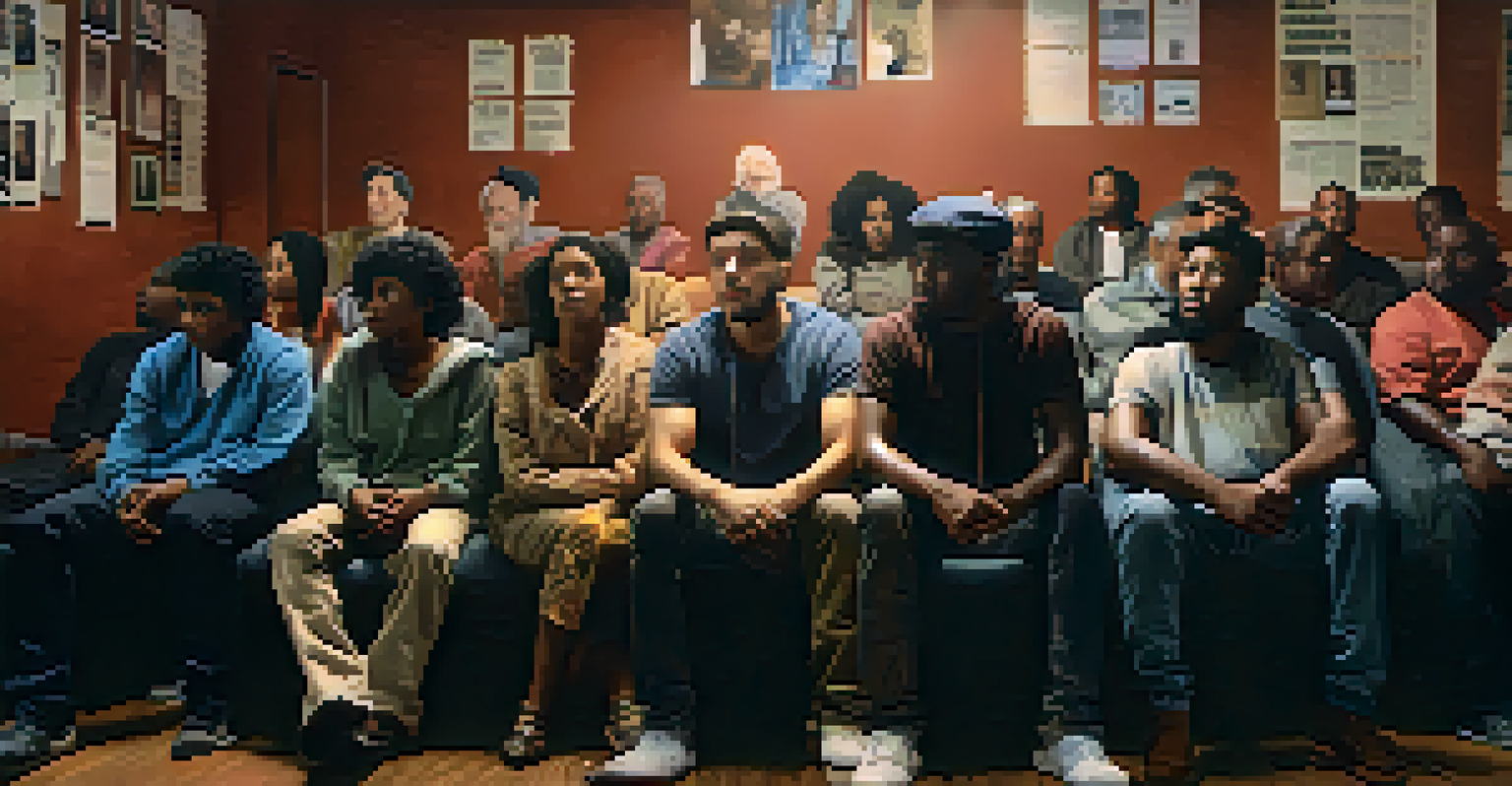The Intersection of Politics and Film: Hollywood's Voice

The Historical Bond Between Politics and Film
Since the dawn of cinema, film has been a reflection of societal values, including political sentiments. Early movies often depicted political issues subtly, providing commentary on war, governance, and social justice. For example, Charlie Chaplin's 'The Great Dictator' satirized Hitler’s regime, blending humor with a powerful political message.
The film industry has a unique ability to reflect and shape the political landscape. It serves as a mirror to society and a catalyst for change.
As the industry evolved, films became a platform for more direct political discourse. The Vietnam War era saw a surge in films like 'Apocalypse Now,' which highlighted the complexities and moral dilemmas of warfare. This intersection of film and politics not only entertained audiences but also sparked critical conversations about national identity and ethical responsibility.
Today, this relationship continues to thrive, with filmmakers using their art to address current political climates. Documentaries and dramatizations often aim to educate viewers, making them more aware of pressing issues, from climate change to social inequality.
Hollywood's Role in Political Campaigns
Hollywood has long been a significant player in political campaigns, with celebrities often endorsing candidates and causes. These endorsements can sway public opinion, as fans may feel a personal connection to their favorite stars. Take, for instance, the impact of celebrities like Oprah Winfrey, whose support for Barack Obama during the 2008 election energized many voters.

Moreover, film productions often use their platforms to advocate for social change, creating awareness around various political issues. Movies like 'Selma' and 'Milk' not only dramatized historical events but also served as rallying cries for contemporary movements, encouraging audiences to engage in activism.
Film as a Political Mirror
Movies have historically reflected societal values and sparked critical conversations about political issues.
As we navigate an increasingly polarized political landscape, Hollywood's involvement becomes even more crucial. The ability of films to humanize complex issues helps bridge divides and fosters understanding among diverse groups.
The Impact of Documentaries on Political Awareness
Documentaries have emerged as powerful tools for political education and advocacy. Films such as '13th' and 'Fahrenheit 9/11' tackle pressing issues like systemic racism and government accountability, urging viewers to reconsider their perspectives. Through compelling storytelling and factual evidence, documentaries hold a mirror to society, prompting reflection and action.
Documentaries can change the world because they can change the way people think. They are a powerful vehicle for social change.
These films often reach audiences beyond traditional political discourse, making complex topics accessible to the general public. By combining emotional narratives with factual information, documentaries inspire viewers to think critically about the world around them and the role they can play in effecting change.
In an era where misinformation can spread rapidly, documentaries provide an essential counter-narrative. They encourage audiences to seek truth and engage in informed discussions, ultimately fostering a more politically aware society.
The Rise of Political Satire in Film
Political satire has become a prominent genre in Hollywood, allowing filmmakers to address serious issues with humor and wit. Shows like 'The Daily Show' and films like 'Dr. Strangelove' utilize satire to critique political figures and policies, making audiences laugh while also encouraging critical thinking. This blend of entertainment and education can be incredibly effective in shaping public opinion.
By exaggerating real-life political scenarios, satirical films force viewers to confront uncomfortable truths. For instance, 'The Interview' sparked discussions about censorship and international relations, illustrating how comedy can illuminate serious issues.
Celebrities Influence Politics
Hollywood's endorsements and storytelling can sway public opinion and engage audiences in political activism.
Moreover, political satire engages younger audiences who may not be as inclined to watch traditional news coverage. By incorporating humor, filmmakers can capture attention and encourage dialogue around significant political matters, making the content more relatable and digestible.
The Global Influence of Hollywood on Politics
Hollywood's impact extends beyond the United States, influencing political cultures worldwide. Films like 'Hotel Rwanda' and 'The Kite Runner' have raised awareness of global humanitarian crises, prompting international audiences to engage with complex issues. This global reach highlights the power of storytelling in bridging cultural divides.
International filmmakers often draw inspiration from Hollywood's approach to political storytelling, creating their own narratives that resonate with local audiences. For example, Bollywood films frequently tackle social and political issues, reflecting the unique challenges faced in India while also drawing parallels to Western narratives.
As globalization continues to shape our world, the exchange of ideas between Hollywood and international cinema can inspire collective action on global issues, encouraging audiences to unite for change.
Challenges Faced by Filmmakers in Political Narratives
Creating politically charged films comes with its own set of challenges, including censorship and backlash from powerful entities. Filmmakers often face pressure to adhere to certain narratives, especially when tackling sensitive subjects. This can lead to self-censorship, where creators tone down their messages to avoid conflict.
Moreover, the polarization of political views can alienate audiences, making it difficult for films to resonate with everyone. A project that aims to challenge the status quo may be met with resistance, limiting its reach and impact. This reality underscores the importance of thoughtful storytelling that invites dialogue rather than division.
Documentaries Drive Awareness
Documentaries serve as essential tools for educating viewers about pressing political issues and encouraging informed discussions.
Despite these obstacles, many filmmakers persevere, recognizing the power of their craft to inspire change. By navigating these challenges, they continue to create impactful narratives that encourage audiences to engage with political issues.
The Future of Politics in Film
As technology advances, the future of political storytelling in film looks promising. With streaming services and digital platforms, filmmakers have more avenues to share their narratives, reaching wider audiences than ever before. This democratization of content means diverse voices can contribute to the political discourse, enriching the conversation.
Moreover, the rise of interactive and immersive storytelling could transform how audiences engage with political content. Virtual reality experiences, for instance, allow viewers to step into the shoes of others, fostering empathy and understanding for different perspectives.

In the coming years, we can expect an even greater intersection of politics and film, as filmmakers continue to respond to the ever-evolving political landscape. This dynamic relationship will not only entertain but also educate and inspire action, ensuring that Hollywood remains a vital voice in shaping political dialogue.